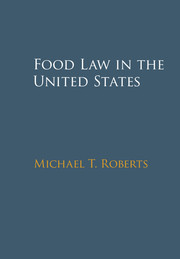5 - Regulation of Nutrition
Published online by Cambridge University Press: 18 December 2015
Summary
Introduction
As noted in the coverage of health claims in Chapter 4, beginning in the 1960s and 1970s, the regulation of nutrition accelerated as the relationship between diet and health became more evident to lawmakers and government officials. One outcome of this acceleration was that the Food and Drug Administration (FDA) began to regulate more aggressively a significant aspect of nutrition and diet – the use of dietary supplements, which began to proliferate in the 1960s. Consumers at that time and still do take dietary supplements to meet their perceived nutritional needs. These same consumers desire accurate information on the effectiveness and proper use of dietary supplements and access to the supplements of their choice. This chapter presents the unique regulatory regime under the FDA and FTC that governs dietary supplements, focusing primarily on where dietary supplements are regulated differently from conventional food.
During this same period and even more so in recent years, the emergence of the rising rates of obesity and the resulting effects on the health of US consumers’ health and health care costs have prompted policymakers to consider further the connection between diet and health. A number of legal tools on a local and national level have been devised to deal with nutrition problems and in particular, the national obesity epidemic. The challenges in implementing these tools reflect the tension between personal responsibility and charges against paternalism and exemplify the complexities in adapting to the changing social conditions brought about by the modern food system.
This chapter will examine two marketing regulation movements that reflect these tensions and complexities and that involve a number of legal tools: menu labeling and marketing to children. This chapter will also outline various food prohibitions and government programs designed to promote nutrition and examine the tool of litigation as used in addressing obesity. Finally, this chapter will address two case studies on the regulation of nutrition: salt and sugar.
Regulation of Dietary and Nutritional Supplements
[1] DSHEA: Regulatory Regime
[a] Tension over Classification: Food or Drug?
The 1906 Pure Food and Drug Act (PFDA) did not address the regulation of dietary supplements. Under the 1938 Food, Drug, and Cosmetic Act (FDCA), FDA recognition was given to foods “for special dietary use” as well as the “vitamin, mineral, and other dietary properties” of those foods.
- Type
- Chapter
- Information
- Food Law in the United States , pp. 318 - 381Publisher: Cambridge University PressPrint publication year: 2016



